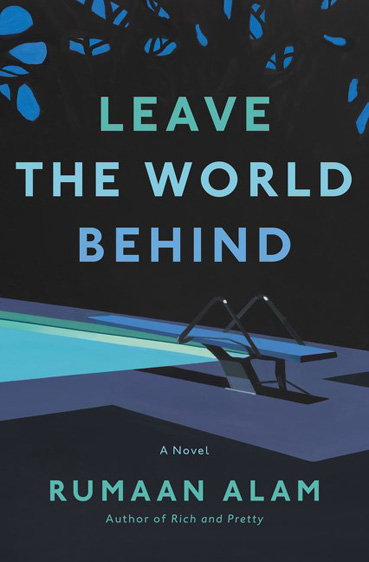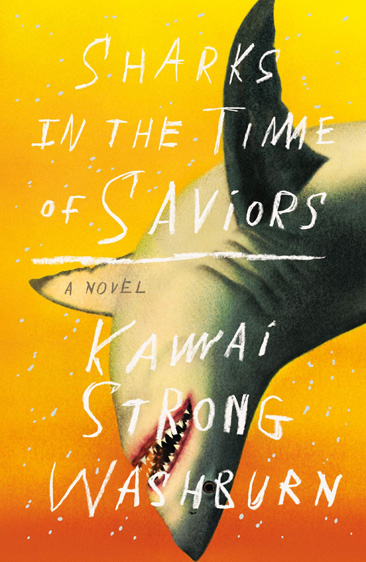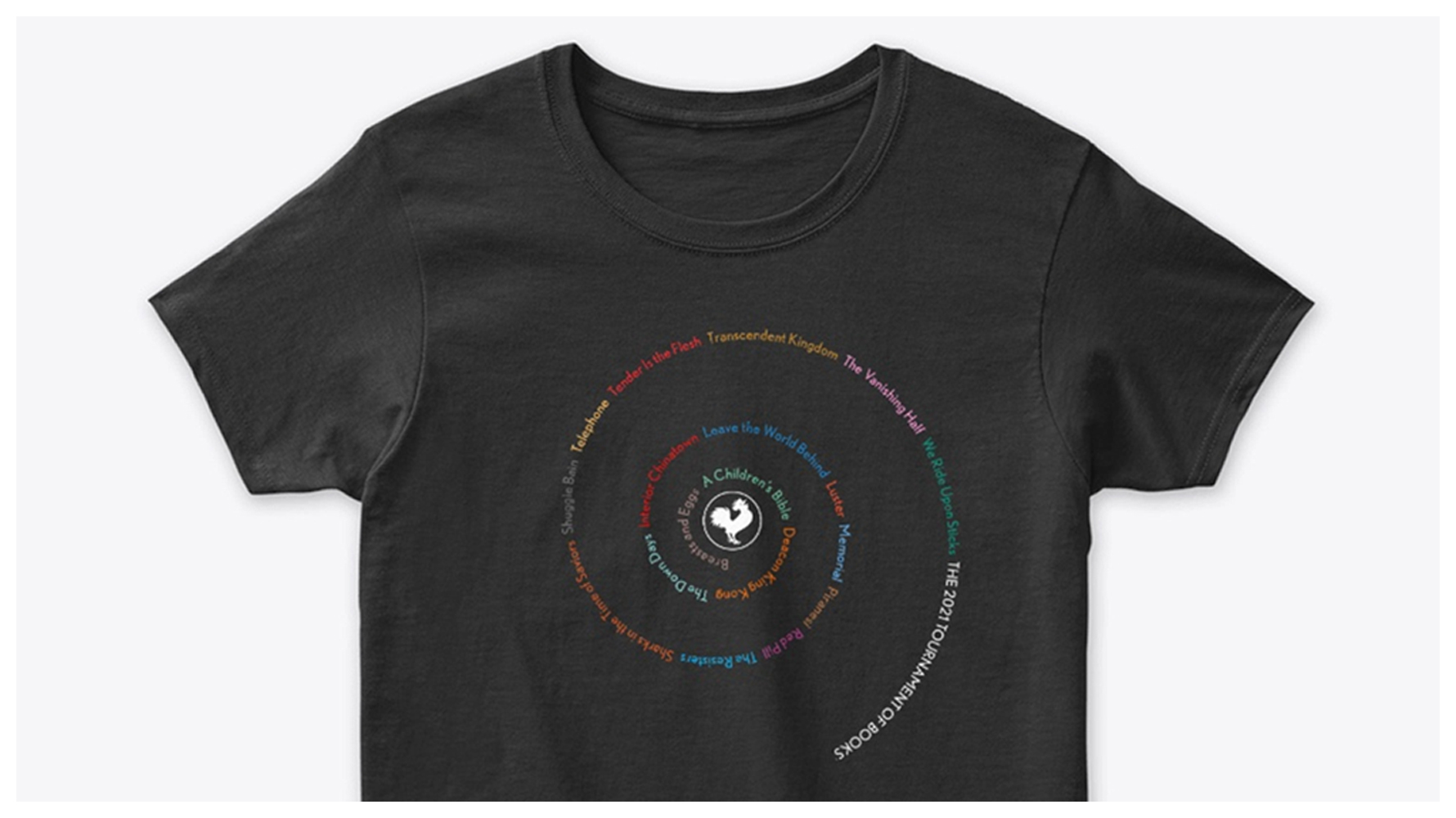-
March 16, 2021
Opening Round
-
Rumaan Alam
2Leave the World Behind
v.
3Sharks in the Time of SaviorsKawai Strong Washburn
-
Judged by
Britta Lundin
Leave the World Behind begins with a white family (mom, dad, two teenagers) whose vacation on Long Island is interrupted when an older Black couple knocks on the door, claiming to be the owners of their rental house, who have come because the power is out in New York, and perhaps Something Has Happened. What has happened? Maybe nothing, or maybe the worst. The details are scant and develop sketchily as the book proceeds. The characters are full of questions, of fear, of uncertainty. It’s an unsettling read.
It was also a strangely perfect book to read as I sat exiled to my bedroom, isolated from my wife and baby. I had exhibited symptoms that may have been Covid-19 or may have just been extreme seasonal allergies. We didn’t know, and this was not something to guess about. So I was alone—just me, my fear, occasional food left at my door, and Leave the World Behind.
I’ve never read a book where characters say “I don’t know” so often. Every character says it. No one knows anything. They don’t know what happened to New York. They don’t know what to do next. They don’t know anyone else’s intentions. Are they safe? Are they doing the right thing? They don’t know. I could relate. I didn’t know if I had Covid. I didn’t know if I would infect my family. I didn’t know when the pandemic would end and my parents would finally get to meet their grandchild, who was now old enough to be on the brink of crawling. 2020 was a year of not knowing. It was a year full of fear and dread, just like this book.
This is a vacation book, and as someone who had to cancel all her vacations for this year and the foreseeable future, I felt real yearning for a well-appointed Airbnb in the country. The writing is—let’s call it detail-oriented. Early on, the mom goes to the store to stock up on groceries for the week. We are treated to a list of every single thing she bought, from sliced turkey to crumbly white cheddar cheese, to “twelve-dollar maple syrup in a faceted glass bottle like a tacky perfume,” to a jar of locally made pickles, to “that pebbly mud-colored mustard” to go with the organic hot dogs and inexpensive buns. It’s quite a list. I considered quoting the entire passage here but it is nearly a page long and I only get so many words to talk to you. It is the sort of thing where you start out thinking, “Yeah, these groceries sound about right” and then you build to “my god, is this book really going to list every item this lady bought?” and then you come back around to “These are exactly the items I would buy if I were turned loose in a regional grocery store on vacation and also I had the money.” This writing is the work of someone who knows his characters very well. Is he showing off? Maybe, but if he is, it’s a lot of fun. Also I want a hot dog.
If Leave the World Behind is about a family desperate to understand their circumstances, Sharks in the Time of Saviors is about a family that’s less concerned with concrete answers than with staying together, despite the situation.
The story of the Flores family (mom, dad, three children: Dean, Nainoa, and Kaui) is told over more than a decade as the children grow up reeling from, and then dealing with, a traumatic incident from when they were young. Noa, when he’s just seven years old, falls overboard from a boat on a family vacation. (Another vacation! Remember vacations?) He’s saved from drowning, inexplicably, by sharks, one of whom gently carries him in her terrifying jaws back to the boat. As he grows up, Noa comes to understand that he has a strange closeness with nature that allows him certain abilities, among them the power to heal.
At first, this ability is a gift, as his family has Noa heal members of their community in return for money that helps lift their family out of poverty. But being so heralded and so different makes him feel lonely and isolated. No one understands him. It’s difficult, too, for his siblings. Older brother Dean feels insecure that he seems to be, well, just ordinary. He turns to basketball as a way to stand out. And younger sister Kaui focuses on her studies, and later, increasingly dangerous rock climbing in her search to understand herself apart from her family. It’s hard to be regularhuman when your brother appears to be superhuman.
There’s a full range of Note Books and related stationery products at fieldnotesbrand.com. Field Notes is proud to once again be a sponsor of the Tournament of Books.
Meanwhile Noa searches for how to use his gift in the most meaningful way possible. Why was this bestowed to him? What is he supposed to do with it? He feels deeply that it has something to do with his home, Hawai’i, with his heritage—a heritage that touches every member of the family in their own way as they spin away from each other and then tumble back together, pulled back to their home.
Both of these books, but especially Sharks in the Time of Saviors, carries a real sense of place. I admit to doing a lot of Google-mapping while reading each of these. (I’ve never been to the Big Island or Long Island.) But while Leave the World Behind felt like it could have taken place at any country escape just outside a city, Sharks in the Time of Saviors was specifically and deeply about Hawai’i. By the end, I felt like I had spent a week exploring the green valleys and digging my toes into the rich brown earth myself.
As a legally certified Gay Person, I’m required to mention here the good shit, i.e., queer content. Aside from the older couple’s lesbian daughter in Massachusetts who we learn named her kids Beckett and Otto (perfect lesbian kid names), Leave the World Behind was pretty dang straight. Sharks in the Time of Saviors had more to offer. It’s told in alternating perspectives and I found myself eager for the Kaui chapters because once she goes to college, she finds herself in a deeply queer fake-platonic, possibly codependent relationship with another girl, Van. This relationship is so familiar and uncomfortable, full of unspoken yearning on the part of Kaui, and drunken kisses that no one talks about the next morning. But Kaui is also ambivalent.
It’s not like I spend all my time thinking of Van’s body, our sex, the physical mechanics of us, okay? It’s how there’s a bright burst when I see her, how everything is all of a sudden coated in this anxious, hopeful warmth. We own each other. Gay? It’s just a word, a syllable, a checkbox. Whatever I am I don’t fit inside it.
As someone who reads a lot (a lot) of queer literature, this is one of the gayest paragraphs I’ve ever seen. I took a picture.
These books are both excellent, and they make a nice pairing, too. Both are elegantly written, both are deep character studies of families in extraordinary circumstances, both take thriller-like turns halfway through that propel the story forward, which I have fastidiously avoided telling you about in order to maintain surprise. But in the end, despite its heteroness, I choose Leave the World Behind. It has a resonance with our current situation that is honestly a little freaky given the author must have written it years ago.
Oh and my Covid test came back negative, but thanks to everyone still worried about that after many paragraphs.
Match Commentary
By Kevin Guilfoile & John Warner
John Warner: It is very rare for a book to do this to me, but I was totally spooked by Leave the World Behind, like straight-up, heart-racing scared. It’s tough to do in print—much easier in film—but there’s some happenings in this book that sent those little shock waves up my spine. I found the book very compelling, but I also have to give a disclaimer to anyone I recommend it to.
I assume someone has done the sensible thing and already optioned Leave the World Behind for film. [You could say that. —ed.] It seems like a no-brainer, inexpensive to produce, small cast, limited sets, quick shoot, some striking cinematic moments to build a script around. Bring that sucker in at a taut 90 minutes and you’re going to have a nice little hit.
But be careful, Hollywood! One of the most remarkable things about the book is Alam’s use of close, third-person narration, which gives us a lot of access to the characters’ interiors and goes a long way toward achieving that powerful psychological intensity.
Kevin Guilfoile: I loved Leave the World Behind. But I’m also excited to have the discussion I look forward to most each year and that everyone else mostly tolerates: the Big Sexy POV Talk. Because Leave the World Behind is mostly told in a revolving close third, as you say, but it frequently breaks into omniscient narration.
This was an irritation for me, because the thing that makes this book so spooky is the feeling of being closed in with these two families and not knowing what is happening “out there.” The futile attempts by the characters to go outside and try to get information raise the frustration level in the reader to the point of high anxiety you describe. That is so great, and cinematic, just as you say. It’s the best effect I’ve felt in a piece of fiction this year.
It feels almost like Alam was concerned that the reader can’t take all this not knowing. That you have to give them a release valve, some veiled glimpse at what is actually going on. And so every couple dozen pages we get these asides in which the narrator reveals that they actually know what is happening and they are just withholding most of the details from you, and every time that happened it broke the spell for me. Not only could I see the author’s hand manipulating the plot, it created a distance between me and the characters in that house because I knew more than they did. I wasn’t stuck in the house with them, I wasn’t suffering in the same way. It’s a device that lets the reader off the hook, but I wanted to stay on the hook, John.
I say this all with apologies to Alam. It’s only because I enjoyed the novel so much that I even care about this stuff. And, of course, he may be right and I may be wrong. Maybe a thing that would have allowed me to enjoy the novel more might have caused others to enjoy it less. Maybe there are a lot of readers that welcomed that release valve.
John: For the record, I liked the asides. The appearance of the omniscient made the whole thing even creepier for me. Sharks in the Time of Saviors has had a great run through the Tournament considering it was the Camp ToB winner from last summer. Strongly battle-tested, but ultimately comes up short.
Kevin: I think Judge Lundin is right on with her assessment of Sharks in the Time of Saviors. Not all of the novel takes place in Hawai’i, but it truly is, as she says, “specifically and deeply” about the islands. It’s a book about legends and families and ancestors, and Washburn has outstanding instincts about what to show and what to hold back and how to move the story forward. The supernatural touches are terrific and also just enough. They are blended wonderfully into the lives of characters who live in the real, recognizable world.
There is a surprise about halfway through the novel that I won’t describe, but I’ve pondered it a lot and I’m still not sure how I feel about it. On the one hand, it’s a twist that is integral to the novel, and Washburn has constructed a very successful work of fiction around it. I don’t think it’s ever fair for a reader to criticize an author for writing the book the novelist wanted to write, as opposed to the book the reader wished he had written, and I’m walking right up to that line, I realize. Washburn takes a huge risk, and I give him a lot of credit for taking it, but I still can’t decide how much was lost in the gamble, as measured against all that was won.
How’s that for talking around a spoiler?
It’s the end of the opening round, which means it’s time to break open the seal on our Zombie poll results and find out which of the books eliminated so far are still potentially in the running for the Rooster. Just to catch up anyone who is unfamiliar with our format: After the field is narrowed to two books, those novels will have to face off against the two most popular books among the eliminated novels, as determined by the results of the pre-Tournament Zombie poll.
These contenders could change as more novels are eliminated, but if the Zombie Round were held today, the two reanimated reads would be, in alphabetical order, Piranesi and The Vanishing Half.
This means, sadly, that we say goodbye for good to The Down Days, The Resisters, Tender Is the Flesh, A Children’s Bible, Transcendent Kingdom, Luster, Shuggie Bain, and Sharks in the Time of Saviors.
The quarterfinals start tomorrow, as Deacon King Kong meets Memorial, with Sean Hooks in the judge’s swivel chair.
New 2021 Tournament of Books merch is now available at the TMN Store. As a reminder, Sustaining Members receive 50 percent off everything in our store. To find out why we’re asking for your support and how you can become a Sustaining Member, please visit our Membership page. Thank you.
Welcome to the Commentariat
Population: You
To keep our comments section as inclusive as possible for the book-loving public, please follow the guidelines below. We reserve the right to delete inappropriate or abusive comments, such as ad hominem attacks. We ban users who repeatedly post inappropriate comments.
- Criticize ideas, not people. Divisiveness can be a result of debates over things we truly care about; err on the side of being generous. Let’s talk and debate and gnash our book-chewing teeth with love and respect for the Rooster community, judges, authors, commentators, and commenters alike.
- If you’re uninterested in a line of discussion from an individual user, you can privately block them within Disqus to hide their comments (though they’ll still see your posts).
- While it’s not required, you can use the Disqus <spoiler> tag to hide book details that may spoil the reading experience for others, e.g., “<spoiler>Dumbledore dies.<spoiler>”
- We all feel passionately about fiction, but “you’re an idiot if you loved/hated this book that I hated/loved” isn't an argument—it’s just rude. Take a breath.




